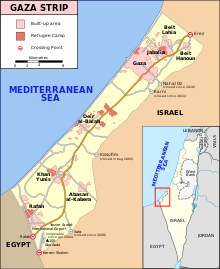Fatah–Hamas conflict
The Fatah–Hamas conflict is an ongoing inter-Palestinian militant conflict between Fatah, based in the West Bank, and Hamas, based in the Gaza Strip. The conflict began after the Second Intifada because Fatah disputed Hamas winning 2006 elections in the Palestinian National Authority (PNA). It grew further when Hamas took control of the Gaza Strip by military force in 2007 during the Battle of Gaza. The two groups have been trying to reconcile in recent years and have since found themselves somewhat on the same side in the 2023 Israel–Hamas war.[a]
Notes[change | change source]
- ↑ Some cells of the al-Aqsa Martyrs' Brigades, the detached armed wing of Fatah, have sided with Hamas against Israel in the 2023 Israel–Hamas war. However, this does not represent Fatah's official public position as a political party.
References[change | change source]
- ↑ Rose, David (March 3, 2008). "The Gaza Bombshell". vanityfair.com. Archived from the original on April 28, 2018.
- ↑ "Archived copy" (PDF). Archived (PDF) from the original on March 3, 2016. Retrieved August 9, 2013.
{{cite web}}: CS1 maint: archived copy as title (link) - ↑ "MIDEAST: This 'Bombshell' Took a Year Falling - Inter Press Service". www.ipsnews.net. April 2, 2008. Archived from the original on April 5, 2018. Retrieved April 5, 2018.
- ↑ Crooke, Alastair. "Blair's counter-insurgency "surge"". www.aljazeera.com. Archived from the original on April 5, 2018.
- ↑ "In Gaza, power cuts and rumors hamper reconciliation". English.alarabiya.net. 1 April 2012. Archived from the original on 1 April 2012.
- ↑ "Egypt crisis brings Fatah, Hamas tensions to new high" Archived September 15, 2013, at the Wayback Machine. Jerusalem Post, 14 July 2013
- ↑ "Anti-Hamas Tamarod group denies involvement with Israel, US" Archived September 15, 2013, at the Wayback Machine. Jerusalem Post, 2 September 2013
- ↑ "What reconciliation? Hamas, Fatah trade blows" Archived September 16, 2013, at the Wayback Machine. Al Jazeera, 14 September 2013
- ↑ "Hamas and Fatah unveil Palestinian reconciliation deal". BBC News. April 23, 2014. Archived from the original on July 18, 2015. Retrieved July 17, 2015.
- ↑ "Palestinian unity government sworn in by Mahmoud Abbas". BBC. June 2, 2014. Archived from the original on June 3, 2014. Retrieved June 6, 2014.
- ↑ 11.0 11.1 Shaked, Ronny (February 3, 2007). "Religious war in Gaza". Ynet. Archived from the original on December 24, 2014.
- ↑ 12.0 12.1 Henry Chu (17 May 2007). "Factional fighting in Gaza imperils unity government". Los Angeles Times. Archived from the original on 1 February 2010. Article reprinted at [1] Archived September 28, 2011, at the Wayback Machine
- ↑ 13.0 13.1 "Over 600 Palestinians killed in internal clashes since 2006". Ynetnews. Ynetnews.com. June 20, 1995. Archived from the original on July 4, 2011. Retrieved April 24, 2011.
Related pages[change | change source]

